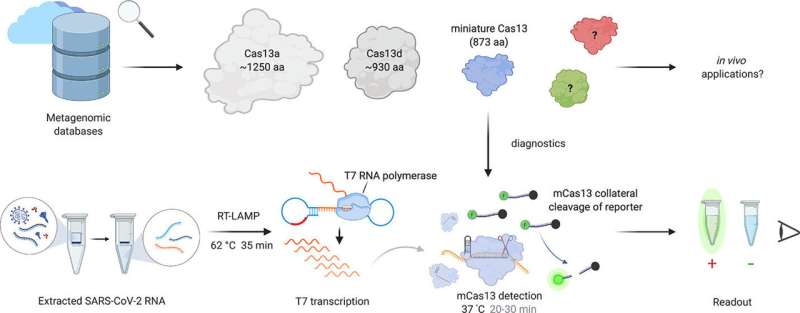Compact CRISPR system enables portable COVID-19 testing

A new form of CRISPR technology that takes advantage of a compact RNA-editing protein could lead to improved diagnostic tests for COVID-19.
The platform, developed by bioengineer Magdy Mahfouz and his KAUST colleagues, relies on a miniature form of the Cas13 protein that some microbes use to defend themselves from viruses. This RNA-cutting enzyme can be designed to cleave any target sequence, including parts of the genome from SARS-CoV-2, the novel coronavirus responsible for the COVID-19 pandemic.
By pairing the Cas13 system with a simple nucleic acid amplification method, a handheld optical reader and a smartphone, the researchers created a low-cost, point-of-care test that could accurately diagnose COVID-19 from throat and nose swab samples taken from patients.
The approach proved reliable and accurate with a fast turnaround time, from clinical sampling to a diagnostic result in just a few hours. "Our modality demonstrates several key features, including simplicity, specificity, sensitivity and portability," Mahfouz says.
A COVID-19 test represents just one potential application of the technology. Other diagnostic or therapeutic uses could soon follow, explains Ahmed Mahas, a Ph.D. student in Mahfouz's lab.
"We aim to develop next-generation sensors that can be applied for the detection of nucleic acids as well as other molecules, such as environmental molecules," says Mahas, the first author of the journal article that describes the diagnostic assay.
The miniature Cas13 system may also be useful as an antiviral therapeutic. The compact nature of the new Cas13 protein makes it easier to package the gene-editing machinery into a viral vector, the standard method for transferring CRISPR components into human cells. Once inside cells, the system could be used therapeutically to alter the expression of disease-associated genes or to destroy pathogens such as the influenza virus.
What's more, "the small size of this novel protein allows for simple protein engineering," Mahas says. And with further molecular tweaks, the KAUST team aims to expand the toolkit of potential Cas13-related applications.
Mahfouz and his colleagues have filed a patent application connected to their CRISPR-Cas13 system. To refine their diagnostic method, they have also continued their search for novel Cas13 proteins. "This work demonstrates that bacterial defense systems have untapped potential for diverse synthetic biology applications," says Mahfouz.
More information: Ahmed Mahas et al, A Novel Miniature CRISPR-Cas13 System for SARS-CoV-2 Diagnostics, ACS Synthetic Biology (2021). DOI: 10.1021/acssynbio.1c00181




















